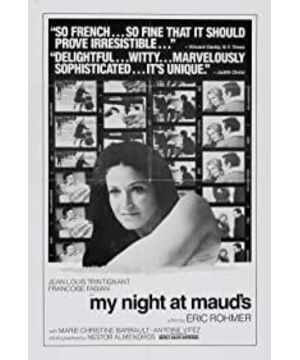I was very tired from work that day, and I was watching in the French Cultural Center, surrounded by all kinds of real and fake intellectuals and international friends.
When the various intellectuals in the film discussed philosophy, I fell into a coma—I have to admit, I still have a hard time getting caught up in high-density dialogue.
As a serious filmmaker, Rohmer is stubborn but has a good sense of humor. He seems eager to pour his own understanding of philosophy and religion into the film, which, in my opinion, is a really good stack. Mulder can be regarded as an active and high-profile leader and party in the film, but to a certain extent, she is also a free and easy bystander, withdrawing from the story and watching the hero's weaving indifferently.
The hero is embarrassed in his own philosophy and religion. A friend said that after waiting for a long time, I just watched the 100th minute. How could he let himself be laughed at for the first 99 minutes of his life at the 100th minute of the film if he didn't have such a face?
In the 100th minute, with the ability of an intellectual to lie, he made a weak resistance to his wife, in order to create a situation of hurting himself to protect himself, and of course, he also maintained the special balance of this embarrassing family. What a wry confrontation. Only intellectuals can produce such high-level humor.
Rohmer's brilliance was born at this moment. He played with his profound philosophical and religious upbringing, and played a problem of human duality with exquisiteness and perfection.
View more about My Night at Maud's reviews










